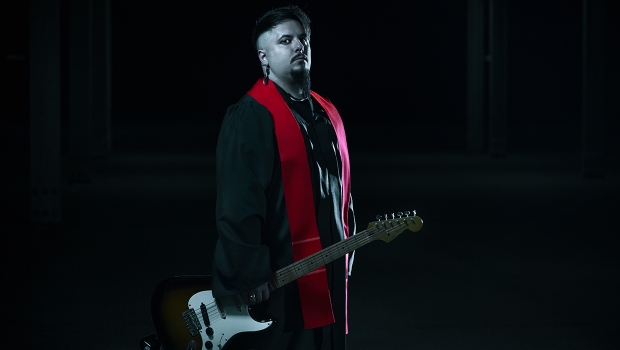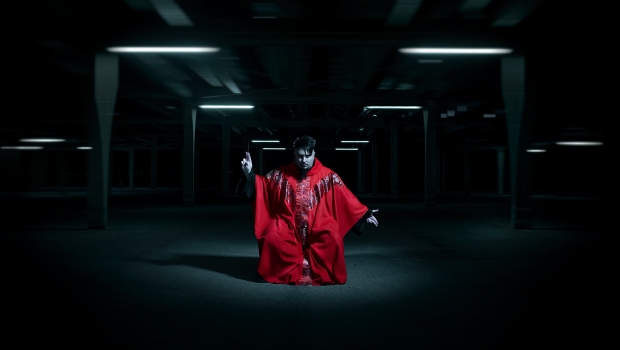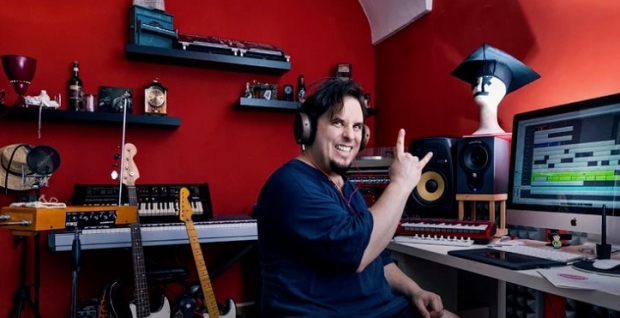Alongside his review of Lucynine‘s Amor Venenat album, TPA’s Nick Hudson spoke to the man behind it all, Sergio Bertani, about the album, his thoughts behind it and how it was put together…
I want to start off by finding out how far from the mark I might be in assuming Amor Venenat might be your version of Type O Negative’s World Coming Down. That album was written after the death of loved ones, and was a cathartic process for Type O Negative frontman Peter Steele. Without resorting to googling, my assumption about the title of your new album is that it translates as “Love Poisons”. The idea that love hurts, or poisons, often accompanies the feelings of the bereaved after a great loss. Amor Venenat seems an intensely intimate and personal album. Without getting too personal, was there a death of someone special to you that prompted this album, which seems as much an exercise in catharsis as World Coming Down was?
You hit the point. Nothing too personal: it’s part of the whole concept of the album. In 2018 I lost my husband to cancer, after an 11 year relationship, and I fell into a deep depression. I was very furious against the feeling of love in its substance. As “love” had been the main reason for all my suffering through the years. Amor Venenat is a musical journey through this pain, a sort of 67-minute long curse against love, starting with my family and the difficult acceptance of my homosexuality, to all my failures, my losses, my disappointments, etc. It was like throwing out all the shit I had been keeping inside me, and this turned out to be my best therapy.
It definitely comes across as a therapeutic release, just as World Coming Down was so clearly cathartic for Peter Steele. The link to World Coming Down is made more overt by the inclusion of a cover of Everyone I Love is Dead. However, I have to ask, is the Day Tripper riff that cheekily appears in Nine Eleven also a tribute to Type O Negative? To anyone not familiar with that band, I would guess most people assume you are making a reference to the Beatles, rather than the Day Tripper Medley which concludes World Coming Down, but given the other similarities to that album, it seems to me this is one more deliberate Type O Negative reference?
Well, do you know that I never linked my Day Tripper quote to the Type 0 Negative medley until now? And it’s… it’s really funny! Because it works!! [Laughs] No, I must confess that I compose most of my music by improvising with guitar, bass or piano, and stopping to write down a phrase or a rhythm when I happen to like something coming out of my hands. And I just was with my guitar on the chorus riff of Nine Eleven and, BANG, Day Tripper came out by chance. I laughed loudly and decided it should be the bridge. But now I promise that, next time someone asks me about that quote, I’ll use your explanation because it’s far cooler than mine! [Laughs]
That is funny! That makes it an incredibly serendipitous riff. Perhaps subconsciously, you knew what you were doing. It works incredibly well as a bridge, regardless. The whole album just seems to flow naturally this way. And, in fact, that flow is almost like a soundtrack to a film, or even a play. There is a peculiarly theatrical vibe that I get, when listening, as if I should be seeing the music accompanying a performance on a stage, or a screen. The music alone gives a sense of narrative, but the use of voice actors really helps give the impression the album tells a story. Was that the reason behind using them?
I do write music for soundtracks, and also work as a photographer and image designer for theatre and actors. I’ve never seen walls between the different ways of expression: music, theatre, art, words. I had written those verses to be spoken, and I simply and naturally chose the best who do that kind of stuff. Gianna, Dario, Grazia and Claudia are among the best actors in Italy, but they are also good friends of mine. It was a pleasure and an honour to have them on the album. Plus, Dario Penne is the official Italian voice of Anthony Hopkins, so it was automatic to link that track to his voice for me.
I love that track, and as I say in my review, there’s so much going on in it. But that’s really what the whole album is like anyway. There are so many moods and styles throughout the album, and even within the individual tracks. Sometimes the changes can be quite sudden, and almost jarring. But again, this seems to me deliberate, in the same way moods can change abruptly during grief. People talk about the stages of grief, but that implies that they are linear, when really one can jump back and forth between them. So there are pieces and passages which evoke feelings of great sadness or anger, or of acceptance – yet, true to life, none really stand out or stick around. The loss remains real, and can catch you unaware at any time. The whole album comes across as a raw and sincere description of the passage of grief. Am I over-thinking this, or was the album meant to portray the stages of grief in this realistic manner?
It works exactly that way. For example, the opener, Family, talks about the relationship between my love and sexual nature, and the religious dogmas I’ve always been facing in my family, and so black metal is the perfect sound to describe this kind of anti-religious point of view. Just as, for example, the hardcore ending of Heartectomy, is so raw and dirty (there aren’t guitars anymore, what you hear is three bass guitars). And the use of my mother language at that point was the best way for me to express that ferocious and bloody anger. Yes, every choice is directly linked to the mood I’m trying to convey to the listener. Maybe this has something to do with the fact that I’m quite used to making music for images (soundtracks, media, etc.) and so for me it’s very essential to drive the listener in my world using all the weapons I have: soundscapes, words, rhythms, changes, impressions.
You mention religious dogma, and obviously religion can be very affective. Apostasia, by its title, infers an abandonment of faith – again something that can be common after the death of someone important to an individual. Italy is known for being a greatly religious country. What relationship do you have with religion? I presume at some stage you will have been Catholic, and that you are no longer? Has faith, or lack thereof, ever affected how you write your music? Is Apostasia even about your personal lack of faith, or is it more general?
I’m an atheist, but I come from a greatly religious country and, most of all, from a greatly religious family (my father was a Catholic deacon). Moreover, I had an awesome teacher of History of Philosophy in high school, and all this contributed to my strongly anti-religious sentiment. And yes, this inevitably results in my music. But Apostasia has not to do with my own faith or loss of it, but rather is about the great limitations religion can put on a relationship between a religious person and an atheist. It’s like if I said: “I hate the concept of god, since it doesn’t allow you to love and live as you are, as you should”.
Do you draw parallels with others who make avant-garde music that tends towards the heavier end of the spectrum, such as Igorrr? Igorrr seems to feel like the most obvious comparison (even though you don’t really sound alike), but although there isn’t really any similarity in sound at all, in my mind I sort of equate you with Ulver. Who would you compare Lucynine with?
I love Ulver! (Not so much Igorrr, even if I find him quite ingenious). I love many avant-garde bands and projects, but in my case it’s just a label I had to choose as it’s unavoidable when you want to put your product on the market. Let’s say that I am really attracted to all those musical situations that do not set limits and range a lot between different influences and sounds, like Mike Patton, Devin Townsend, Trent Reznor, John Zorn, etc. and then surely the fact that I really listen to very different genres of music plays a fundamental role, from jazz to electronics, from classic to industrial, from Brit pop to punk. Just, please, keep the reggaeton away from me. I just can’t stand that. And very little other stuff.
I listen to a wide variety of genres, too, and I never really like to dismiss a genre, as within almost any genre, I can find something I like. Well, as with you, maybe not the reggaeton. But actually, that’s probably what I love most about Amor Venenat – how so many disparate genres are packed into the album. There’s some glorious trip hop that wouldn’t be out of place on a Portishead or Massive Attack album, along with some extremes from black metal and industrial worlds. As someone who devours music, regardless of genre, this is great for me – but it possibly limits the reach of the album. Too experimental and eclectic for many of those who like their music brutal and extreme, and vice versa. Is this something you even care about? Again, it seems such a personal album, that maybe it doesn’t really matter what others think, or how many people show interest?
I’m aware of this “limit”. And some reviews I read pointed out this aspect as a negative aspect. What can I say? I’m a bit sorry about it, but on the other hand I can’t do my thing in another way. I don’t have the presumption to say “I don’t give a fuck, I’m the artist, I do what I want”. No, I would be highly hypocritical to say that I don’t care about people’s judgement, so I just hope people sit down and try to understand my language with no prejudices. It’s a sincere record, with sincere feelings.
You mentioned Portishead and Massive Attack: I love them both, they are among my favourite bands ever (I can imagine you noticed it). On my first EP, John Baggott, who played keyboards for both those bands, was a guest musician on one track.
There’s a huge length of time between that first Lucynine EP and this album. Is there any particular reason for that? The only release in between was your Tribute to Titor, is that right?
Yes, and it started as a “quarantine joke” during the first Covid period, then it turned out as a real EP. Well, I did many things in these years, as some music for short documentaries, two short movies (I did everything for the first one and only music and voice direction for the second) and other little things, but with my name, not under the moniker of Lucynine. There’s another sadder reason for this long “silence”: some years ago I had to sell big part of my studio to survive a difficult economic situation and so I had no chance of working on music for a long time. But now I’m on my way again and great things are next to come!
That’s great news indeed. Based upon my enjoyment of Amor Venenat, I can’t wait to hear what comes next! Thank you so much for taking the time to answer my questions.
Thank you for your questions, sincerely!
[You can read Nick’s review of Amor Venenat HERE.]







